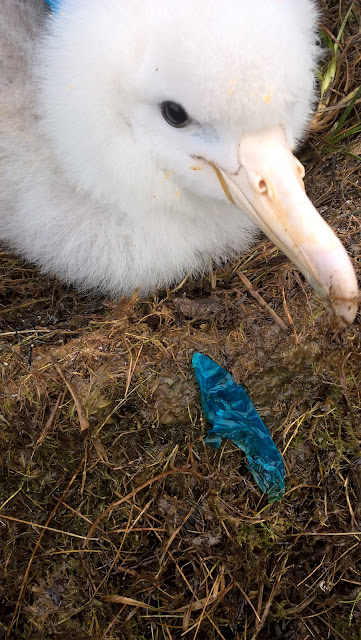Last week we headed up to the Tristan Albatross colony at
Gonydale to monitor this year’s breeding attempt. So far so good, we still have
over 120 chicks. The mice are keeping their distance, and we’ve only had a few
failed nests. Fingers crossed that many of these chicks will make it to
fledging age.
It isn’t just the mice that threaten these beautiful birds
though. Whilst visiting the colony, we came across a stark reminder that even
those chicks that grow to fledging age still face some daunting statistics.
Chief amongst the threats they face out to sea are long-line fishing vessels,
which often catch albatrosses accidentally, and the vast amount of waste
plastic that makes its way into our oceans. There has been a lot in the news
recently about the millions of plastic bags, bottles and other items from our
throwaway society. Albatrosses hunt for food on or near the surface of the
water, where a lot of this debris ends up, and a floating plastic bag can look
remarkably similar to a squid. Albatrosses will dive down and swallow it whole,
where it then sits in the bird’s stomach and doesn’t break down or biodegrade.
Scientists carrying out dissections often come across birds which stomachs so
full of plastic that there is literally no space for anything else.
One of our young chicks vomited a plastic bag while we were
visiting the colony. These are birds that are too young to fly, and so have never
left the mountains of Gough. One of its parents must have swallowed a plastic
bag and unwittingly brought it back to feed to its chick. It’s shocking to
think that even here, in a place so untouched by humans, wildlife is still
threatened by us.
Still, it’s not all doom and gloom. The Albatross Task Force
is constantly working to help fisheries change the way they fish to reduce the
threat to albatrosses, and there are many initiatives around the world to clean
up the oceans. People are becoming ever more aware of how our actions impact
the world around us, so hopefully our lovely albatrosses will face far fewer
threats in the future.
Em


No comments:
Post a Comment